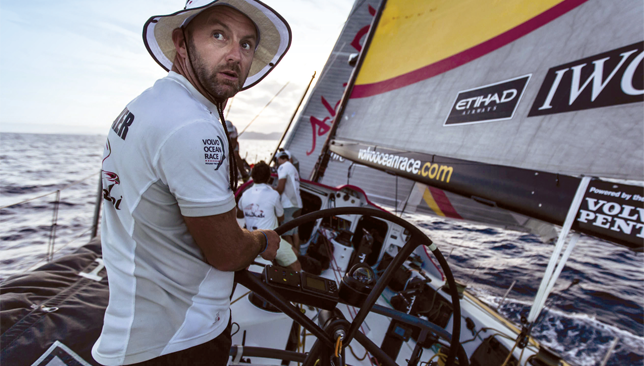
Ian Walker is the skipper behind Abu Dhabi Ocean Racing’s bid to win the 2014/15 Volvo Ocean Race, which will be the longest voyage in the event’s 40-year history.
The race, which lasts nine months and includes nine legs, will finish in Gothenburg next June.
On the eve of the first leg, which departs Alicante for Cape Town this Saturday, two-time Olympic silver medallist Walker reveals how life at sea is anything but plain sailing.
How did you first get into sailing?
I lived near a little lake that belonged to Chipstead Sailing Club, near London, where I started by crewing for people.
How long have you been doing it?
I started when I was eight and I’m now 44, so I’ve been sailing for 36 years, and have been a professional since university.
What is your favourite destination (visited or would like to visit)?
Sydney Harbour is a fantastic place. It’s where I won an Olympic medal (in 2000) so I have very proud memories of that place. I also like Miami, both off and onshore, as we’ve done a lot of training there. The Cape Town scenery and food is amazing.
I’m looking forward to visiting Auckland this time because most people there have boats and the population has a strong understanding of sailing and there’s lots of enthusiasm. Abu Dhabi is the big stopover for us, it was the most popular one last time and it will probably be the same again.

How do you cope being in close quarters with the same people for so long, and being away from your loved ones?
The one drawback of what I do is that I’m away from my family a lot. I’m used to it but it doesn’t make being away from them any easier, but they’ll be in Abu Dhabi for the three weeks we’re there for Christmas and hopefully they’ll be at two more of the stopovers too.
As for the crew, on board you have to respect each other and we have a strict watch system, so with eight crew members, we have four on and four off watch at any one time.
At sea, how do the crew keep themselves entertained when there’s no rigging or boat maintenance to do?
Most of the lads will bring their iPods or iPads and listen to music or watch films, otherwise it’s just sailing, although we’ll keep each others’ spirits up by telling tales and stories.
What is the craziest/funniest thing that has happened to you at sea?
In the last race in 2011/12, we laminated the hull at sea. In order to fix the boat in the middle of the Southern Ocean, we capsized it and drilled 30 holes in the hull. We just chucked someone over the side in a safety suit and drilled 30 holes in the boat. So doing that 1,500 miles from dry land was probably the craziest thing I’ve ever done.
What do you like to do when you’re out of the boat and on dry land?
One of my main passions is kite surfing, as well as tennis, going to the gym and socialising with friends.

Have you got any plans when you drop anchor in Abu Dhabi, what are your favourite spots to visit in the city?
Abu Dhabi is our home port and I hope the second leg to Abu Dhabi will really ignite the team. Leg One is important but our main aim is to win the leg coming into Abu Dhabi.
I’ve been resident in the city since 2010 so I like kite surfing on Yas Island lagoon, cycling and running around the grand prix track on Tuesday evenings, or playing golf, badly, at any local course. The kids love Yas Waterworld too.
What kind of fitness do crew members need in order to take part in such an arduous challenge like the VOR?
The crew balance aerobic exercise with strength. We take training pretty seriously and have been training for six days a week since February. It’s a 50 per cent mix of weight training as well as cycling, rowing and running.
Who is your sailing or sporting inspiration?
In terms of sailing and leadership, I look to Ernest Shackleton (who led a 1916 sailing expedition to Antarctica) or (former Royal Navy captain) James Cook as old school examples of how they led voyages in their time.
In the modern day, any sportsman who maintains their peak is impressive, for example Roger Federer or Tiger Woods in his prime. They earned so much fame, money and success, but they kept going for the love of the sport; they still drive themselves on in spite of reaching the peaks.